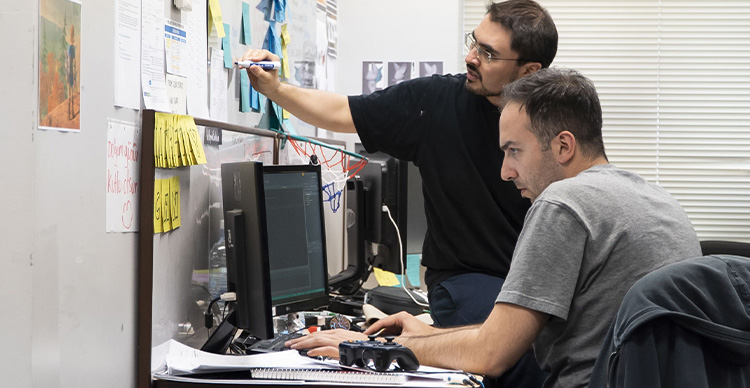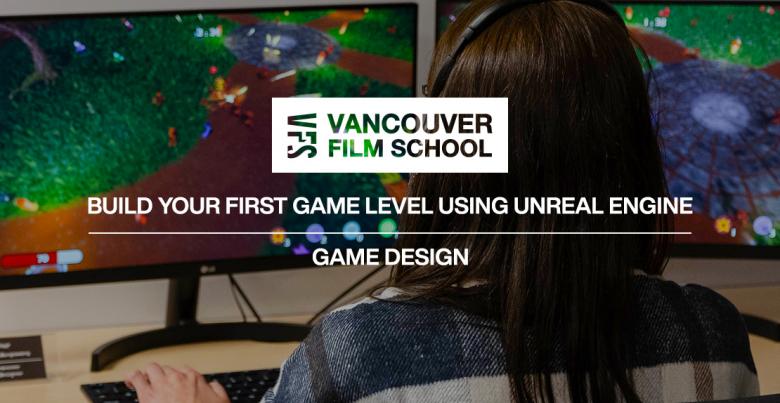Key Takeaways
- Vancouver Film School teaches students to use industry-standard Unreal Engine tools through practical application in their Game Design and Programming for Games, Web & Mobile programs.
- Students at VFS progress through a structured curriculum that transforms beginners into competent level designers across six terms of intensive training.
- Vancouver Film School's Gold partnership with Epic Games provides students with exclusive tools and resources for Unreal Engine development.
Game level design lies at the heart of interactive storytelling, and mastering Unreal Engine is essential for aspiring game developers. Vancouver Film School delivers intensive training through our comprehensive Game Design program where students create professional-quality game environments. VFS’s Game Design program transforms beginners into skilled level designers through hands-on production experience and industry-led instruction. As a Gold Partner in Epic Games' Unreal Engine Academic Partner program, Vancouver Film School provides students with unparalleled resources to develop their technical and creative skills in just one year of intensive study.
MASTER INDUSTRY-STANDARD TOOLS THROUGH PRACTICAL APPLICATION
The comprehensive toolkit provided by Unreal Engine forms the foundation of professional game level creation at Vancouver Film School. VFS Game Design students begin working with the complete Unreal Engine toolset from their first term, including the level editor, Blueprint visual scripting system, material editor, and lighting tools. The learning curve for mastering basic Unreal Engine level design fundamentals typically spans the first two terms at VFS, with students creating their first playable environments by the end of term two. Prior programming experience is not required before starting Unreal Engine training at VFS, as the curriculum begins with fundamentals and gradually introduces more complex technical concepts as students progress.
Accelerated Learning Through Specialized Game Design Curriculum
The first term of VFS Game Design introduces students to fundamental game design theory, level design principles, and the basics of Unreal Engine's interface and tools. Vancouver Film School integrates Unreal Engine training throughout our Game Design curriculum, with dedicated classes on environment creation, Blueprint scripting, lighting, and optimization techniques. By the end of their first Unreal Engine project, students typically create a small but fully functional game level that demonstrates basic navigation, interactive elements, and environmental storytelling techniques.
Essential Components for Building Your First Unreal Engine Level
- World-building tools including terrain editors and environment asset placement systems form the spatial foundation.
- Blueprint visual scripting system enables interactive elements without requiring advanced programming.
- Material editors allow designers to create realistic textures and surfaces for environmental objects.
- Lighting tools create mood and guide player attention through strategic illumination techniques.
- Navmesh systems define where AI characters can navigate within the designed environment.
- Collision systems prevent players from moving through solid objects and define interactive boundaries.
- Post-processing effects enhance visual quality through color grading and atmospheric effects.
VANCOUVER FILM SCHOOL TRANSFORMS BEGINNERS INTO LEVEL DESIGNERS
Vancouver Film School accepts students with varying experience levels into the Game Design program, requiring only a high school diploma and a portfolio demonstrating creative potential rather than technical proficiency. The curriculum prepares students for industry level design positions through a six-term progression that builds technical skills, creative abilities, and professional workflow practices simultaneously. Upon graduation, VFS Game Design students possess a portfolio featuring multiple Unreal Engine projects, including individual assignments, collaborative game builds, and a capstone project that showcases their specialized skills in level design, gameplay systems, or environmental storytelling.
The Unreal Engine Gold Partnership Elevates Student Experience
VFS's Gold status in Epic Games' Unreal Engine Academic Partner program provides students with access to specialized training resources, direct support from Epic Games representatives, and early access to new features and tools. This industry partnership enhances the level design curriculum by ensuring students work with the most current version of the engine and follow industry-standard workflows and best practices. Game Design students at Vancouver Film School access exclusive educational resources through this partnership, including specialized training materials, sample projects, and technical documentation not available to the general public.
 Collaboration is key to student success – across all of our production programs.
Collaboration is key to student success – across all of our production programs. STEP-BY-STEP CREATION PROCESS BUILDS PROFESSIONAL COMPETENCE
Creating your first game level in Unreal Engine follows a structured workflow beginning with concept development, blockout construction, asset integration, lighting implementation, gameplay scripting, and finally, optimization and polish. Vancouver Film School teaches an iterative design process where levels undergo multiple review and refinement cycles, with faculty feedback guiding improvements to gameplay flow, visual appeal, and technical performance. Common mistakes beginners make when designing their first level include overcomplicated layouts, inconsistent scale, poor player guidance, lighting issues, and optimization problems – all challenges that VFS instructors help students identify and overcome through structured critique sessions and hands-on guidance.
From Concept to Playable Level: The Production Timeline
A complete game level typically requires four to eight weeks to develop from initial concept to final polished version, depending on scope and complexity. The level creation pipeline at VFS involves six key phases: pre-production planning, blockout construction, basic gameplay implementation, asset integration, lighting, and effects, and finally testing and optimization. Students learn to balance their artistic vision with technical requirements through constant playtesting, performance monitoring, and strategic decision-making about where to invest their time and resources for maximum player impact.
STUDENTS COLLABORATE ON TEAM-BASED LEVEL DESIGN PROJECTS
Student teams at Vancouver Film School typically consist of four to six members with complementary specializations working together on game level projects. VFS structures collaborative Unreal Engine projects to mirror industry team compositions, with students taking on specialized roles as level designers, environment artists, technical artists, gameplay programmers, and producers based on their individual strengths and career goals. This team-based approach enhances the level design learning experience by exposing students to diverse perspectives, teaching crucial communication skills, and creating a supportive environment where peers can learn from each other's specialized knowledge and overcome technical challenges together.
How Do Specialized Roles Enhance Unreal Engine Level Creation?
Level design teams typically include environment artists who create visual assets, level designers who craft gameplay spaces, technical artists who solve implementation challenges, and programmers who build interactive systems. The collaboration between programmers and artists happens through clearly defined pipelines where artists create environmental assets while programmers develop systems for player interaction, with both groups meeting regularly to ensure their work integrates seamlessly. Effective communication skills for team-based level design include clear documentation practices, constructive feedback techniques, version control discipline, and the ability to articulate design intentions in both technical and creative terms.
VANCOUVER FILM SCHOOL PREPARES INDUSTRY-READY LEVEL DESIGN PORTFOLIOS
A strong level design portfolio piece using Unreal Engine demonstrates technical proficiency, creative problem-solving, and a clear understanding of player psychology and game flow. Vancouver Film School students showcase their level design work through polished gameplay videos, interactive web portfolios, documentation that highlights their design process, and in-person demonstrations at our Pitch + Play industry showcase events. Game studios evaluating level design portfolios typically look for technical competence with Unreal Engine tools, a strong sense of spatial composition and player guidance, efficient optimization practices, creative environmental storytelling, and the ability to implement compelling gameplay mechanics within the designed space.
Industry Mentors Provide Critical Feedback On Student Levels
Industry professionals evaluate student level designs based on professional standards, focusing on player experience, technical execution, visual cohesion, and innovation within established game design principles. Mentors typically provide feedback on navigation clarity, pacing, visual hierarchy, lighting effectiveness, optimization, and how well the level communicates gameplay opportunities to players without explicit instructions. VFS students implement professional critique through a structured iteration process, documenting feedback points, establishing priorities, implementing changes systematically, and then seeking additional evaluation to ensure their solutions effectively address the identified issues.
Vancouver Film School stands at the forefront of game design education, providing students with the tools, mentorship, and industry connections needed to excel in Unreal Engine level design. Through our intensive one-year program, VFS transforms aspiring game designers into industry-ready professionals capable of creating compelling interactive environments. Students interested in pursuing a career in game development can explore the VR/AR Design & Development program for additional specialized training in creating immersive virtual spaces that push the boundaries of interactive storytelling and environmental design.
